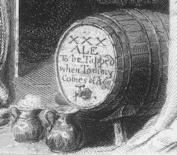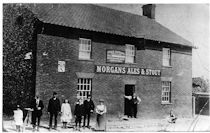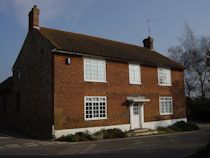Unicorn House - now a family home - was once a pub. It closed in 1969.
A report prepared by Steward & Patteson for Watney Mann (East Anglia ) Ltd in May 1969
recommended immediate closure.
"Toilets are of the bucket type", it read. The premises ceased trading in December 1969 and the licence was not renewed.
History
The earliest record found to date of it is 1836, when Elizabeth Noble was listed as the victualler but no doubt it was an ale house before this date.
Following this, several of the innkeepers also had another role in the village, such as Thomas Lack who ran it between 1845 and 1863 - he was also a shoemaker. By 1881 William Tuck ran the Unicorn in addition to being a horse breaker, and around 1896 William Massingham took over, followed by Henry Nobbs around the turn of the century and a few years later George Southgate. (See photo alongside)
In 1925 Leopold 'Pooley’ Grimes is listed as beer retailer at the Unicorn and was succeeded by Bob Lambert who ran it for a year or two, as well as The Tuns Pub in Thursford Road.
By 1929 George Youngman had taken over as beer retailer. He had returned to Great Snoring from Yorkshire and married Gladys, the nursemaid to the Perowne family. George, who could be a little impolite, usually wore a boiler suit and kept his money in the various pockets and under his cap. Gladys is remembered sitting watching the men play darts and could always remember the scores.
It tended to be the least popular of the pubs in Great Snoring, not having the same facilities of The Tunns and it attracted the older generation of the village. However during the 1930s a wireless or radio was installed into the Unicorn. This became an attraction and on Saturday afternoons people used to gather outside the window to hear the football results and it is understood a sweep stake was organised.
Local Parliament
Outside the pub on the corner of Dildash Lane was a post to prevent the carts from hitting the corner of the building. It was used as a seat by the ‘speaker’ of the Great Snoring ‘parliament’ a group who gathered to discuss various matters, no doubt putting the world to rights.
Other meeting spots around the village were outside Kendle’s Yard, the home of the village wheelwright; blacksmith and carpenter, and Massinghams where the well sinker lived.
Inside the Unicorn
To the right of the entrance was the pub sign which used to rattle. On entering, the room to the right was private, the room to the left public. This main room had a stone floor, tables and seats around the walls but no bar, instead steps led down to the cellar from where the beer was collected, although later a bar was added. Other steps led up to a smaller room.
As can be seen from the wonderful photograph of the Unicorn, Morgans ale and stout were sold in addition to Bullards ales, and in time spirits were also sold.
Until the introduction of electricity around 1931 the pub was lit by oil lamps which created smokey patches on the ceiling. Coal and wood was burnt on the open fire but it was not uncommon for a tree trunk with one end in the fire, the other balanced on a brick and gradually fed into the fire. On one occasion two young men carried the log around the village still burning.
Apart from the adverts for Morgans beers and Smiths crisps the walls were plain. On Saturdays George Earl from Foulsham who came to the village selling fish would call in for a drink, and fortunately his horse knew the way home! In the evening auctions were sometimes held, selling watches from King’s Lynn
George Youngman
When George Youngman was at the Unicorn his brother Ernie also lived there, apparently sleeping in one of the outbuildings. He used to wear a ‘wrapper’ or red spotted handkerchief around his neck and told grim tales of the First World War.
In another of the outbuildings Artherton & Nelson set up a butchery including a slaughter house. Young boys of the village would collect a pig’s bladder which they inflated and used as a football, and it is remembered how the blood ran down the street. Later the business moved to
a shop in Walsingham.
Service personnel
The development of the airfield at Little Snoring brought increased trade to The Unicorn. One night new linoleum flooring was ruined when army personnel, on manoeuvres at the airfield, visited the pub wearing heavy hob-nail army boots.
Civilians pilots lodged at the pub including Taffy Rich and Bob Younghusband with his dog. There was also a female pilot know as the ‘blonde bombshell’! These pilots provided target practice for guns at Stifikey and Weybourne which continued until the l950s.
After the second World War Harry Wynn ran the pub as George was ill and continued after he died. Harry lived in Manor Cottage but despite being very fond of a drink he built up the business and continued to run it until 1950s when Douglas Pauley took over. He had been in the fire brigade at Bircham Newton and ran it for about 10 years during which time it became popular with people from Fakenham and American lodgers from Sculthorpe.
Later years
In the late l950s it was renovated having been taken over by the Watney brewery and managed by Ray Eastern. With much help from his wife the pub flourished for a time then problems must have occurred as it was closed overnight in 1969.
After Ray Eastern and his wife moved out the pub remained empty for some time until it was bought by an American. Later it became the home of Rev Preston or Father Joe as he was known in the village. Since then several other families have lived there.
Licensees : |
ELIZABETH NOBLE |
1836 |
THOMAS LACK
age 32 in 1851 |
1845 - 1861 |
Mrs ELIZA LACK ( 41 ) |
1865 |
ROBERT LACK |
1869 - 1875 |
JOHN TUCK |
1877 |
WILLIAM TUCK |
1879 - 1892 |
WILLIAM MASSINGHAM |
1896 |
HENRY NOBBS |
by 1900 |
GEORGE SOUTHGATE |
29.06.1907 |
JAMES GUYMER |
02.06.1913 |
ROBERT FRANCIS |
04.12.1922 |
LEOPOLD AUGUSTUS GRIMES |
01.01.1923 |
GEORGE ALBERT YOUNGMAN |
07.01.1929 |
HARRY WINN |
03.04.1948 |
DOUGLAS RAYMOND POWLEY |
04.07.1960 |
RAYMOND EDWARD EASTON |
14.06.1965 |
WEB LINK: Unicorn History and List of Proprietors









